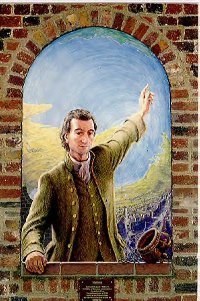See Dissecting Deism Past and Present
Romanticism Notes
Romanticism rejects reason for mysticism, intuition, feelings. Rationalism came under challenge in Europe in the nineteenth century, which historians lump together under the term "romanticism." That romantic challenge made its impact in America too. The romantic spirit turned from reasoned analysis to appeals to immediate intuition and from individualism to a new emphasis on the unity of communities, of humanity, and indeed of the whole universe.
Rationalist Unitarians like William Ellery Channing had argued from the Bible and the evidence of its miracles. In the 1830s Transcendentalists like Ralph Waldo Emerson appealed instead to immediate intuition, which told Emerson that "the world is ... the product of one mind ... everywhere active, in each ray of the star, in each wavelet of the pool."
I don't need to turn to the Bible to find revelation, Emerson said; I can look within myself. "Men have come to speak of revelation as somewhat long ago given and done, as if God were dead.... In how many churches ... is man made sensible that he is an infinite soul; that the earth and the heavens are passing into his mind; that he is drinking forever the soul of God."
Why single out a few events long ago as miracles when Jesus "felt that man's life was a miracle"? The rationalist idea of a miracle as a violation of some law of nature is a "monster. It is not one with the blowing clover and the falling rain." Religion does not provide some external standard by which I judge myself, for "no law can be sacred to me but that of my own nature." Indeed, "I become a transparent eye-ball. I am nothing. I see all. The currents of the Universal Being circulate through me; I am part or particle of God."
Transcendentalism inspired many young Bostonians impatient with Unitarian rationalism, but it led them in many different directions. Theodore Parker became a popular lecturer who praised Jesus as a teacher of love but insisted that Christianity really concerns what we make of our lives now. "If it could be proved ... that Jesus of Nazareth had never lived, still Christianity would stand firm." Orestes Brownson pursued interests in sacred mystery and tradition to one logical conclusion and became a Roman Catholic. But the romantic turn from reason to intuition and from individualism to Community ran through the whole movement.
Ref:, The City on a Hill by William C.Placher
This laid the groundwork for New Age religion and environmentalism as religion in my opinion.
Romanticism Notes
Transcendentalism: A Reaction against Deism/Unitarianism
Deism = "corpse cold" (Emerson)
Associated with "Light" Romanticism
Beliefs:
Exaltation of the Individual over Society
Privileging Intuition and Emotion over Reason
Emphasis on Inward Illumination (Truth lies within, not without)
God's spirit is in everything, including oneself In other words mysticism.
Live Close to Nature: God created the universe out of Himself and therefore is in it (Pantheism)
Religion is Personal: No church, no creed--One looks inward for God
Emphasis on Self-Reliance (which is, in essence, God reliance) In reality, man is god.
Everything in the world contains within itself the laws and meaning of existence
Man is "a god in ruins" (Emerson)
Main Figures:
Ralph Waldo Emerson (Nature, 1836)
Henry David Thoreau (Walden, 1854)
Walt Whitman (Leaves of Grass collection, especially "Song of Myself," 1855)
"Dark" Romanticism Characteristics:
Emphasis on the tragic dimension of life
Not simply pessimistic or cynical
An awe at human nature, human struggles, suffering, mortality, and humankind's relationship to God
An Emphasis on Mystery (i.e., the profound mysteries of existence)
A belief in the reality of Evil
Key Concept:
Solipsism: "The theory that the self is the only thing that can be known or verified" Can imprison a person in his or her own mind.
Some Philosophical and Literary Influences:
Calvinism
The Bible
Tragic Drama
Shakespeare
"Byronic" Rebellion (the heroic anti-hero)
Key Figures:
Herman Melville
Nathaniel Hawthorne
Edgar Allan Poe
Some of Emily Dickinson
Ref. http://www.tridenttech.org/english/felty/home.htm
Primitivism
J. J. Rousseau (d. 1778) is the father of Romanticism and the idea of primitivism or "the noble savage." Rousseau's life consisted mainly of sexual and moral confusion, impregnating his laundress, and then dumping their many children at an orphanage to die. He founded the idea of primitivism.
Primitivism is an irrational belief system often promoted by the environmental movement. Modern Rousseauism received a major impetus from the cultural anthropologists, such as Ruth Benedict, Margaret Mead, Franz Boas, etc. , who went eagerly to visit the existing primitive tribes. They praised the gay, happy tribal life free of private property and no inhibitions imposed by monogamous marriage. Sexual liberation has its roots in primitivism where feelings and emotions overrule reason and science. This is also the root of the hatred of Western civilization by leftist intellectuals.
Quoting Down With Primitivism: A Thorough Critique of Polanyi by Murray N. Rothbard,
There are several things to be said about this worship of the primitive. First, it is absolutely illegitimate to do...and infer the history of pre-Western civilization from analysis of existing primitive tribes. Let us never forget that the existing primitive tribes are precisely the ones that didn't progress and remained in their primitive state.
To infer from observing them that this is the way our ancestors behaved is nonsense and apt to be the reverse of the truth, for our ancestors presumably behaved in ways, which quickly advanced them beyond the primitive stage thousands of years ago. To scoff, therefore, at the idea that our ancestors among primitive tribes engaged in barter, and then in monetary exchange, etc., on the basis of the magic and games indulged in by present-day primitives, is a blunder of the highest order.
Second, it is implicitly and even explicitly assumed that the way primitive tribes act is more "natural," is somehow more appropriate to man than the "artifices" of civilization. This is at the root of Rousseauism. The way ignorant, fear-ridden, quasi-animalistic savages act is somehow more natural, because presumably more "instinctual," than the ways of civilization. This is the root of Rousseau's, and many other leftists', view that man is "naturally good," but is corrupted by his institutions.
This basic idea is fundamentally and radically anti-human, because it denies the basic facts about human nature and the way human beings must necessarily operate. Animals are born with "instincts"; these instincts are, in essence, sense-determined responses. Animals do not possess a free will, rational consciousness; hence, they can only adapt, in sensory fashion, to their environment.
Man, on the other hand, can alter his given environment by use of his reason and his free will. Man is born a tabula rasa; he must learn and learn how to choose the ends that are proper for him, and the means, which he must adopt to attain them. All this must be done by his reason.
Civilization is precisely the record by which man has used his reason, to discover the natural laws on which his environment rests, and to use these laws to alter his environment so as to suit and advance his needs and desires. Therefore, worship of the primitive is necessarily corollary to, and based upon, an attack on intellect.
It is this deep-seated "anti-intellectualism" that leads these people to proclaim that civilization is "opposed to nature" and [that] the primitive tribes are closer to it. And because man is supremely the "rational animal," as Aristotle put it, this worship of the primitive is a profoundly anti-human doctrine.
Anti-human, anti-rational doctrine, then, goes eagerly to illiterate, savage, fear-ridden primitives as people on whom we're "the heirs of 2000 years of the finest products of civilization and the human race" are supposed to model ourselves. If an existing primitive tribe has no private property, or engages in indiscriminate promiscuity, this should be all the more reason for us to do the reverse.
The myth is then coined of the "happy savage," that [these] primitives are truly happy and content. Let us shed the vestiges of romantic mythology and look at these savages as they are. They are, in the first place, complete slaves to their environment. When the fruit tree is in bloom, they can perhaps subsist by picking the fruit off the tree; but suppose there is a blight, one year, on fruit trees? What happens to this "happy-go-lucky" tribe? It dies, en masse. It is no wonder that the primitive tribes are all small in number.
Secondly, the primitive's life is a life of almost constant terror. Terror of the world about him, which he does not and cannot understand, since he has not engaged in any sort of scientific, rational inquiry into its workings. We know what a thunderstorm is, and therefore do not fear it, and can take rational measures against lightning; the savage does not know, and therefore surmises that The God of the Thunder is displeased with him, and that therefore that god must be propitiated with votive offerings and sacrifices (sometimes human sacrifices).
Since the savage has no concept of a world knit together by natural law (a concept which employs reason and science) he believes that the world is governed by a whole host of capricious spirits and demons, each of which can only be propitiated "with only partial "success" by ritual, by magic, and by a priestcraft of witch doctors who specialize in this propitiation.
So fearful is the savage that he can do nothing on his own, that his individuality is virtually completely undeveloped" because the individual savage makes almost no use of his reason and of his mind. Therefore, virtually everything the savage does is governed by immutable, utterly irrational, taboos or command: by custom.
And this is the fear-ridden, barely-human, creature whom we, people who have used our intellect to "conquer" nature, are being asked to emulate, whom Polanyi extols as being truly "social," and as being happily free of the "inhuman" despotism of the free market.
Moreover, the life of the savage, as Hobbes put it, is "nasty, brutish, and short." His life expectancy is very short, and his life is ravaged by all manner of disease, disease that he can do nothing about except give food to witch doctors to utter incantations. The increasing conquest of disease has been made possible only by the advance of civilization: by the use of reason, by capitalism, and by the market.
For an excellent discussion of Rousseau, primitivism, and the romantic movement, see Irving Babbitt, Rousseau and Romanticism
- Islam Versus Deism
- Left vs Right, Montesquieu, Corporatism
- Eastern Roman Empire and Islam
- Philosophies of Islam, Greece, and the West by Turgut Ozal
- Example of Islam and science.
- Maimonides Versus Aristotle and the Jews of Spain, Thirteen Rules
- Handbook on the History of Modern Science
- Pelagius and why he was right
- Islam Versus Judaism and Christianity
- Islam to Deism: Why I became a Deist
Web site Copyright Lewis Loflin, All rights reserved.
If using this material on another site, please provide a link back to my site.

